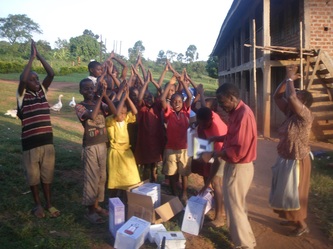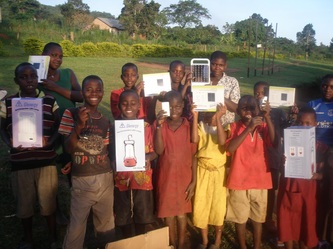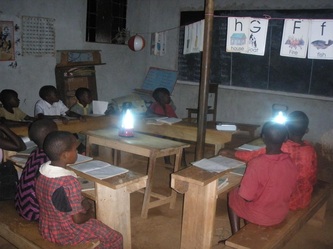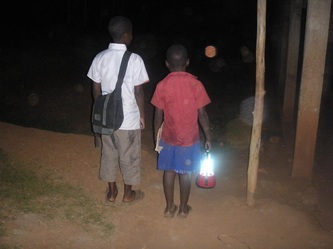Safe, clean and inexpensive solar lighting will change young lives in Uganda
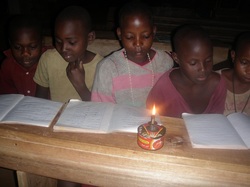
Typical kerosene burner
The Rotary Club of Eganville is making a difference in young lives in the Mpigi and Gomba districts of Uganda. Coordinated through an intermediary, Mr. Kenneth Kasule of the Wide Smiles Through Education charity in Uganda and with solar lights furnished through Glenergy Inc. of Petawawa, Ontario (Rotarian Glen MacGillivery, Rotary Club of Petawawa) the Rotary Club of Eganville is helping students in rural Uganda to succeed in their education.
Imagine for a moment having no source of light once the sun goes down ; only the small flickering flame of a kerosene lamp! This is the reality in an area where a reliable source of electricity is non-existent. When asked about replacing kerosene with solar lights, Mr. Kasule was very candid. "Kerosene is very expensive and they [kerosene burners] have lead to deadly fires in schools; with schools being destroyed" He went on to say that school administrators are apt to restrict the use of kerosene after sundown as a cost cutting measure. Kerosene light is poor and often leads to vision problems as young eyes have to squint to see text. The fumes cause respiratory problems. The further away from the flame, the more difficult it is to see. This leads to competion amongst students to get closer to the source. Size and strength win out when there is no supervision. There is also a danger of stepping on snakes when venturing into the darkness for a trip to the pit latrines (usually some distance away from the buildings) after sundown. Lights are portable.
With solar lights, the performance of the children is expected to improve as they will have enough time to read and revise lessons without the fear of running out of kerosene for the next evening. Teachers will benefit the same The cost savings from not having to purchase kerosene is a boon to budget stretching. Kenneth expects the children will develop a new sense of pride in accomplishment by being able to excel in their education. There sould be less competition and more cooperation. "The stepping on snakes in the dark will be mitigated" said Mr. Kasule.
For a donation of a mere $631.00 Canadian, sufficient lights were made available to the Homeland School and Orphange and The Devine Preparatory School in Gomba.
Father Charles and Rebecca and students at the Homeland School and Orphange give praise for the gift of light. The benefits of two small solar lights in a darkened school room are obvious. Contrast that with the picture above. The lights are portable when venturing out of doors after dark. A fully charged light will last for twelve hours and the life expectancy of the light is 5 years.
Imagine for a moment having no source of light once the sun goes down ; only the small flickering flame of a kerosene lamp! This is the reality in an area where a reliable source of electricity is non-existent. When asked about replacing kerosene with solar lights, Mr. Kasule was very candid. "Kerosene is very expensive and they [kerosene burners] have lead to deadly fires in schools; with schools being destroyed" He went on to say that school administrators are apt to restrict the use of kerosene after sundown as a cost cutting measure. Kerosene light is poor and often leads to vision problems as young eyes have to squint to see text. The fumes cause respiratory problems. The further away from the flame, the more difficult it is to see. This leads to competion amongst students to get closer to the source. Size and strength win out when there is no supervision. There is also a danger of stepping on snakes when venturing into the darkness for a trip to the pit latrines (usually some distance away from the buildings) after sundown. Lights are portable.
With solar lights, the performance of the children is expected to improve as they will have enough time to read and revise lessons without the fear of running out of kerosene for the next evening. Teachers will benefit the same The cost savings from not having to purchase kerosene is a boon to budget stretching. Kenneth expects the children will develop a new sense of pride in accomplishment by being able to excel in their education. There sould be less competition and more cooperation. "The stepping on snakes in the dark will be mitigated" said Mr. Kasule.
For a donation of a mere $631.00 Canadian, sufficient lights were made available to the Homeland School and Orphange and The Devine Preparatory School in Gomba.
Father Charles and Rebecca and students at the Homeland School and Orphange give praise for the gift of light. The benefits of two small solar lights in a darkened school room are obvious. Contrast that with the picture above. The lights are portable when venturing out of doors after dark. A fully charged light will last for twelve hours and the life expectancy of the light is 5 years.
Devine Preparatory School, Gomba
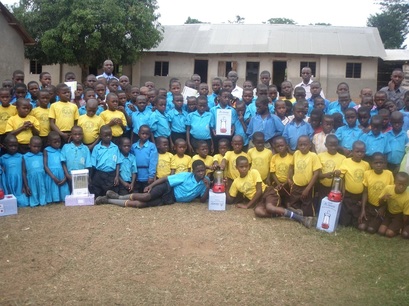
Elisha Tamale Barker, Director of The Devine Preparatory Schools, Gomba writes this on June 5th:
"This is to send our sincere appreciation for the six solar rechargable lamps and their charging systems donated to our school. Our school is located in a rural place with a population of 250 students and 17 staff members but with no hydro electricity power. So the donation of these lamps came at a time when we need them most for the students to do their evening prep work and the teachers to prepare for what they will teach the following day. We shall effectively use them as they have reduced the cost of parrafin and dry cells.
May the Lord bless you."
"This is to send our sincere appreciation for the six solar rechargable lamps and their charging systems donated to our school. Our school is located in a rural place with a population of 250 students and 17 staff members but with no hydro electricity power. So the donation of these lamps came at a time when we need them most for the students to do their evening prep work and the teachers to prepare for what they will teach the following day. We shall effectively use them as they have reduced the cost of parrafin and dry cells.
May the Lord bless you."
Solar Power: more than just lights
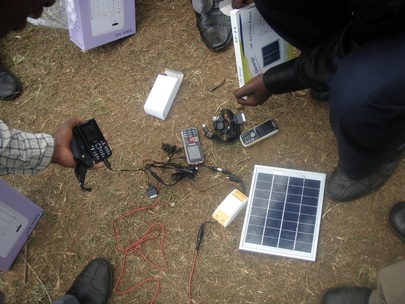
Cell phones are the most common and effective means of communication in this part of the world. Normally, one would have to travel to a kiosk some distance away or to a place where there is electricity to recharge a phone battery. The Rotary Club of Eganville also provided adapters that allow phones to be recharged from the solar panels provided to recharge the lamps. Here staff at the school demonstrate this time and money saving recharging device.
